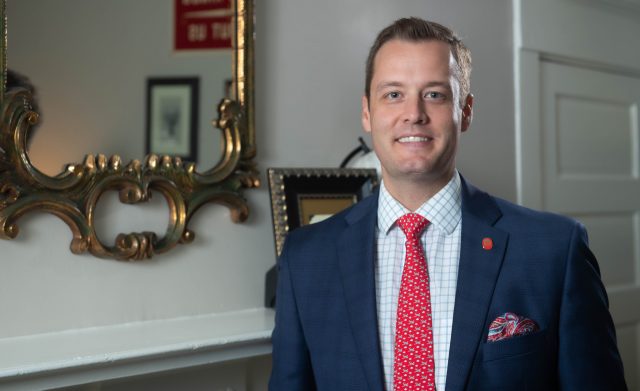
Andrew Newby, UM assistant director of veterans and military services, is serving as a Stand-To Veteran Leadership Program Scholar at the George W. Bush Institute, where he will share his experiences working with veterans and bring the knowledge and experience of other veteran leaders back to campus. Photo by Kevin Bain/Ole Miss Digital Imaging Services
OXFORD, Miss. – Ever since Andrew Newby left the U.S. Marine Corps, he’s been dedicated to helping veterans transition into their civilian lives, due in part to his own experience accessing Veterans Affairs benefits and health care.
Now, as a Stand-To Veteran Leadership Program Scholar at the George W. Bush Institute, Newby, assistant director for veterans and military services at the University of Mississippi, has a chance to share and hone his ideas for making the lives of student veterans easier.
“Andrew Newby is well-known for the passionate leadership and enthusiasm he brings to helping our military-connected students succeed and thrive,” Chancellor Glenn Boyce said. “His selection for this prestigious program is quite an honor and will help take the remarkable efforts of our Veteran and Military Services team to a new level.
“I’m excited how the learning experiences and invaluable resources offered through this fellowship will help our university more effectively engage and support this important community.”
Since Newby’s arrival on campus, the university has climbed the Military Times’s Best for Vets ranking, moving up to No. 21 this year among public institutions and becoming the second-ranked SEC school for veterans and military-connected students.
A Passion Project
As part of his application to the program, Newby highlighted the UM Veteran Treatment Team project, which he’s been working to implement since 2018.
“When I was a student veteran, it took over two years to get my first VA appointment,” he said. “It was convoluted and difficult. It’s not that bad anymore, but you’ve got veterans waiting two months or more to get an appointment.”
Veteran Treatment Teams are meant to coordinate VA benefits with resources already available on college campuses so that student veterans – who are more likely to be nontraditional students – are no longer trying to balance home, work and school while scheduling appointments and travel to a VA hospital hours away.
“People who have VA health care have specific needs that are often consequences of service, conflict and war,” Newby said. “I don’t want them worrying about traveling to for hours to get to an appointment while trying to arrange for child care and school work, when they could handle their health care on campus.”
Having someone who can speak the language of the military and the varying levels of local, state and federal government all while pursuing better outcomes for student veterans is crucial for the university, said Natasha Jeter, assistant vice chancellor for wellness and student success.
“Andrew is a relentless leader who doesn’t take ‘No’ for an answer,” Jeter said. “He continues to push the envelope, and it’s all in service of improving our veteran and military services.”
First from Mississippi
Newby began the scholar program in June and will continue to meet virtually and at the George W. Bush Institute in Dallas for five months, learning what others are doing to improve post-9/11 veteran outcomes and share his Veteran Treatment Teams program with other veteran service leaders from across the country.
Scholars will hear from former President Bush; Robert McDonald, former U.S. secretary of veterans affairs and Bush Institute April and Jay Graham Fellow; Lt. General Nadja West; Stanford University professors and past program alumni.
“I’m beyond thrilled to be able to work with these incredible leaders and colleagues from across the country,” Newby said. “I hope to get answers to some pressing questions about what to do with transitioning service members as they become veterans – looking at their health care, education and employment.
“The beauty of this program is that there will be 51 new ways to take care of military-connected people across the country when the program concludes. Thought leaders from across the country are working to create new and innovative ways to answer some of the most pressing issues this community faces.”
Newby served over 10 years in both the U.S. Marine Corps and the Army National Guard, and spent four years working with veterans at Auburn University before moving to Ole Miss in 2017.
He also serves as an executive board member of the Department of Veterans Affairs Community Veteran Engagement Board, a member of the Veterans Affairs Administrators of Mississippi Board and chair for the Veterans Advisory Board. He teaches LIBA 305: War and Homecoming and EDHE 305: The Veteran Transfer Experience courses at UM.